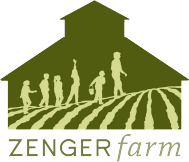Internship Open for 2025 Season
See application and instructions below. We will begin reviewing applications on May 1st for the summer cohort, and on July 1st for the fall cohort.
General Internship Overview
Time Commitment
- Wednesday and Thursday, 8 hours/day. There are two different cohorts, one in summer and one in fall.
- Summer: June 18th – August 7th
- Fall: August 20th – October 9th (Subject to change)
Responsibilities
- Field Work: Most field work at Zenger Farm is done by hand, and includes seeding, planting, weeding, watering, trellising, harvesting, hauling, washing, and packing produce for sale
- General Farm Maintenance: Tool and equipment care, farm and property upkeep
- Summer and Fall tasks will differ, please inquire for more information
Qualifications
- Interest in gardening or farming.
- Ability to lift and carry 50 pounds, farm outdoors in all weather conditions and perform the above responsibilities.
- Attitude: Positive, driven, flexible and team-oriented.
Benefits
This is an unpaid volunteer internship, room and board are not provided
- Hands-on training in small-scale, sustainable farming practices
- 8 hours of workshop instruction in sustainable farming practices
- 1 CSA share during internship dates
Selection Timeline
We will begin reviewing applications on May 1st for the summer cohort, and on July 1st for the fall cohort.
For candidates we will be moving forward with:
1) Expect to hear back from our Farm Production Program Manager, Kristie (kristie@zengerfarm.org).
2) You may receive a follow-up email and/or form to gauge interest/needs/considerations.
3) You may be invited to participate in a one-to-one farm tour which includes casual interview questions with Kristie, followed by a short working interview (working in the fields with our farm crew).
Application Instructions
You can apply online with the form
Contact Kristie Winberg (kristie@zengerfarm.org) with any questions, but please do not submit your application by email.
About the Internship
This internship provides interns with a taste of farming. Those selected will gain experience in farm tasks such as transplanting, weeding, trellising, harvesting and packing shares for a CSA. Interns leave the program ready to work on sustainable mixed-vegetable farm as a Crew Member. Some people use this program to decide whether to pursue a future in farming. Still others use this program to gain skills that they use in their careers as educators, chefs, gardeners, social workers and at non-profit organizations.
Zenger Farmers care for four acres of diversified vegetable crops. Zenger Farm is certified organic. We grow over 150 varieties of vegetables on just over two acres where we spend the vast majority of our time. Our produce is primarily distributed through our CSA, with about 60 shares picked up by community members at the farm and 65 shares delivered to patients at the nearby Multnomah County Mid County Health Center. The remainder of our produce sales is to local restaurants, grocery stores and other non-profits. What remaining produce we have is shared with our staff or donated through our partnership with Urban Gleaners and redistributed to the community through their free food markets and events.
The core of the Zenger Farm Crew consists of three seasoned farmers with a breadth of experience in market farming, regenerative agriculture, no and low till production methods, dry farming, and more. Four short-season interns will join the crew 2 days/week for 8 weeks in the Summer and again in the Fall. We also welcome volunteer work parties from local businesses, our communities and staff from other programs. Farm interns spend much of their time closely mentored by our crew lead or one of our other farm coordinators.
Education of the body is the core component of this internship. We teach interns the underlying ergonomics of farm work. Proper ergonomics are essential for an economically-viable farm. Speed, stamina and efficiency are what allows small farmers to compete when other farms lower their costs with machinery, chemicals, and exploited labor Farm interns will recieve guidance, instruction and feedback on how to improve these skills.
We seek to provide a compassionate education. Zenger Farm recognizes that many people, disproportionately Black, Indigenous and Latine folks, have historical and current traumas related to land access and agricultural work. We also recognize that training farmers to operate an farm focused on production within a capitalist system hinders our ability to create a healing environment to address that trauma. While recognizing our current limitations, we strive to create as much of a supportive environment as possible through mindfulness, shared responsibility, use of Nonviolent Communication, regular check-ins, open feedback (both given and received), and Popular Education methods.

